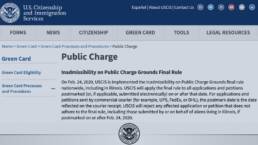On February 24, 2020, U.S. Citizenship and Immigration Services (USCIS) began implementing the “Inadmissibility on Public Charge Grounds” final rule nationwide. USCIS will apply this final rule to all applications and petitions postmarked (or, in applicable, submitted electronically) on or after that date. USCIS will reject any affected applications or petition that does not adhere to the final rule, if postmarked on or after February 24, 2020.
Background
On August 14, 2019, the Department of Homeland Security (DHS) published a final rule amending the regulations related to the public charge ground of inadmissibility, which would apply to cases decided by USCIS. This rule was supposed to go into effect on October 15, 2019. Before the regulation took effect, several nationwide injunctions prevented its implementation. On January 27, 2020, the U.S. Supreme Court granted the Trump administration’s request for a stay of the nationwide injunction against DHS’s public charge rule, thereby allowing DHS to implement the public charge rule nationwide, except for Illinois, which had gained a statewide injunction of its own. On February 21, 2020, the U.S. Supreme Court lifted the last remaining injunction in Illinois, thereby allowing DHS to implement the new public charge rule nationwide on February 24, 2020.
In tandem to DHS’s new public charge rule, the Department of State (DOS), the agency that controls visa decisions at U.S. consulates and embassies around the world., was also making updates to their corresponding public charge inadmissibility for those. On October 11, 2019, DOS, published a new rule related to public charge inadmissibility applicable to individuals who are immigrating from outside the U.S., or for individuals who must immigrate through an interview at a consulate or embassy outside the United States. The DOS rule was set to take effect at consulates on October 15, 2019, but again, implementation was halted by intervening lawsuits. On October 24, 2019, DOS published their proposed Form DS-5540, Public Charge Questionnaire. On February 12, 2020, DOS published “DOS Notice of Intent to Seek Emergency OMB Approval of Public Charge Questionnaire,” seeking emergency Office of Management and Budget (OMB) approval of proposed form DS-5540. On February 20, 2020, OMB approved the new Form DS-5540, and on February 21, 2020, DOS published revisions to the Foreign Affairs Manual to reflect updates to the public charge inadmissibility ground, with an effective date of February 24, 2020.
What is “Public Charge”?
Under U.S. immigration law, “public charge” is a ground of inadmissibility—grounds of inadmissibility are reasons that a person could be denied a green card, visa, or admission to the United States. In determining whether to grant an applicant a green card, visa, or admission to the U.S., an immigration officers must decide whether that person is likely to become dependent on certain government benefits in the future, thereby making them a public charge.
Who is Subject to the Public Charge Rule?
As mentioned above, not all immigrants are subject to the public charge ground of inadmissibility. Only those individuals seeking admission to the U.S. or applying for a green card based on a petition filed by a U.S. Citizen or permanent resident family member are subject to public charge. However, there are many immigration statuses exempt from the public charge inadmissibility ground or do not have an applicable public charge test including, but not limited to, refugees, asylees, certain nonimmigrant trafficking and crime victims, individuals applying under the Violence Against Women Act (VAWA), and special immigrant juveniles.
New Definition of “Public Charge”
In general, the public charge inadmissibility determination is a discretionary and prospective determination based on the totality of an applicant’s circumstances. In determining whether an applicant is inadmissible on the public charge ground, USCIS must assess whether the applicant is likely to become a public charge in the future and not whether the applicant is currently a public charge or was a public charge in the past. To this end, USCIS must determine:
- Whether the applicant is more likely than not to receive one or more public benefits at any time in the future; and
- Whether the applicant’s likely receipt of one or more of the public benefits at any time in the future is more likely than not to exceed 12-months in the aggregate within any 36-month period (such that, for instance, receipt of two benefits in 1 month counts as 2 months).
If the applicant is more likely than not to receive one or more public benefits in the future, and such receipt is likely to exceed 12 months in the aggregate within a 36-month period, then the applicant is inadmissible on the public charge ground. Conversely, if the applicant is not more likely than not to receive public benefits in excess of 12 months in the aggregate within any 36-month period, then the applicant is not inadmissible on the public charge ground.
Benefits Considered in the Public Charge Determination
As part of the public charge inadmissibility determination, USCIS considers both cash and noncash benefits including:
- Any federal, state, local, or tribal cash assistance for income maintenance such as:
- Supplemental Security Income (SSI);
- Temporary Assistance for Needy Families (TANF), which may be provided under another state name;
- Federal, state, or local cash benefit programs for income maintenance (often called “General Assistance” in the state context, but which may exist under other names);
- Supplemental Nutrition Assistance Program (SNAP);
- Medicaid (with some exceptions); federally funded Medicaid may also be provided under a state name;
- Section 8 Housing Assistance under the Housing Choice Voucher Program;
- Section 8 Project-Based Rental Assistance (including Moderate Rehabilitation); and
- Housing under the Housing Act of 1937.
Minus a few exceptions, Form I-944, Declaration of Self-Sufficiency, is now required when filing an adjustment of status application. It is used by an individual to demonstrate that he or she is not inadmissible based on the public charge ground. In addition to Form I-944, applicants are now required to submit a variety of evidence. Berardi Immigration Law is located just minutes away from the U.S.-Canadian border in Buffalo, New York. If you have any questions or concerns about entering the United States, be sure to contact Berardi Immigration Law.
Ready to have Berardi on your side?
Whether you’re a business looking to hire or a professional hoping to relocate, immigration law can be complicated. But you don’t have to do it alone. Put our experience to work for you.



